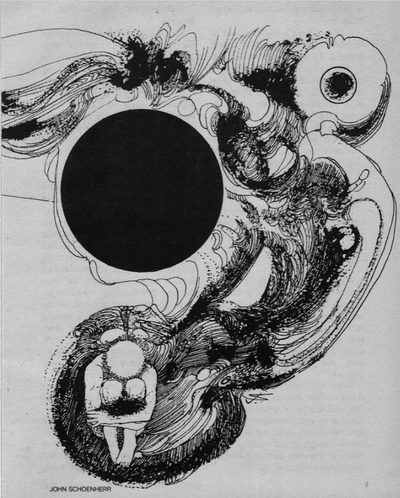Kris:
Particle Theory:
I have been trying to work out why this didn’t quite work for me. It is perfectly cromulent science fiction, I get the point and ideas of comparison between the big and small, the galactic and personal. But (I think it was) Aldiss said that the role of a critic to explain why a story made them feel bored. So here what I think are my completely subjective reasons for why it didn’t work for me:
- I didn’t like Nick. Whilst I appreciate what he is going through, even before then he comes across as a moody jerk to me who mistreats Amanda. I do not enjoy those kinds of characters leading my tales.
- It had too much engineering talk for me, that is the bane of science fiction stories during this period. I don’t need to know all these details of astronomy or atomic physics.
- The narrative style was probably newer to SF audiences 50 years ago but I felt like I had seen these tricks before.
So, I can appreciate that others will likely love this, but didn’t work for me.
Brian
Funny that “Particle Theory” appeared in Analog when it did, because had it been published a decade later it absolutely would’ve appeared in Asimov’s. It’s the kind of story Gardner Dozois ate up. In fairness, the “almost plotless mood piece about a melancholy and self-centered protagonist” routine was not yet commonplace in 1977. I was reading Ted Chiang’s introduction for “Particle Theory” and was honestly surprised he considered Bryant such a big influence. But then, thinking about it, I do see the comparison. I think Bryant was an early practitioner of the self-serious “personal” SF writer, of the sort that Chiang very much belongs to. It might’ve been fresh in the late ’70s, but it certainly is not now.
Bryant garnered a string of awards nominations around this time, and even two back-to-back Nebula wins. I’ve read enough of early Bryant that I can say I don’t think his work is really to my taste, if only because I prefer my disco-era SF to be a lot more fun. For how problematic he is, early John Varley is a lot more entertaining than Bryant; or another way of looking at it is that Bryant comes off as like early Varley if he had almost no sense of humor or wonderment about the universe. Writing about the two in close succession for this club, it’s easy to see how despite both being boomers who are also very post-New Wave, Bryant and Varley also have very different temperaments with different goals in mind. Early Varley’s stuff is basically adventure fiction with a twist, whereas Bryant is a lot more concerned with “inner space.”
On a less serious but no less relevant note, I forgot just how much of the plot of “Particle Theory” hinges on a middle-aged guy’s prostate. I try not to think about that sort of thing myself, because I’m young, and handsome. Bryant himself would’ve been a year or two older than me when he wrote this story, which makes me wonder what got him to think about aging and death (be it the death of life on Earth or the death of one man). Maybe it’s the existential crisis a lot of people feel when they turn 30, or are about to. In that way I think it’s relatable, but it’s also a bit of a slog.


